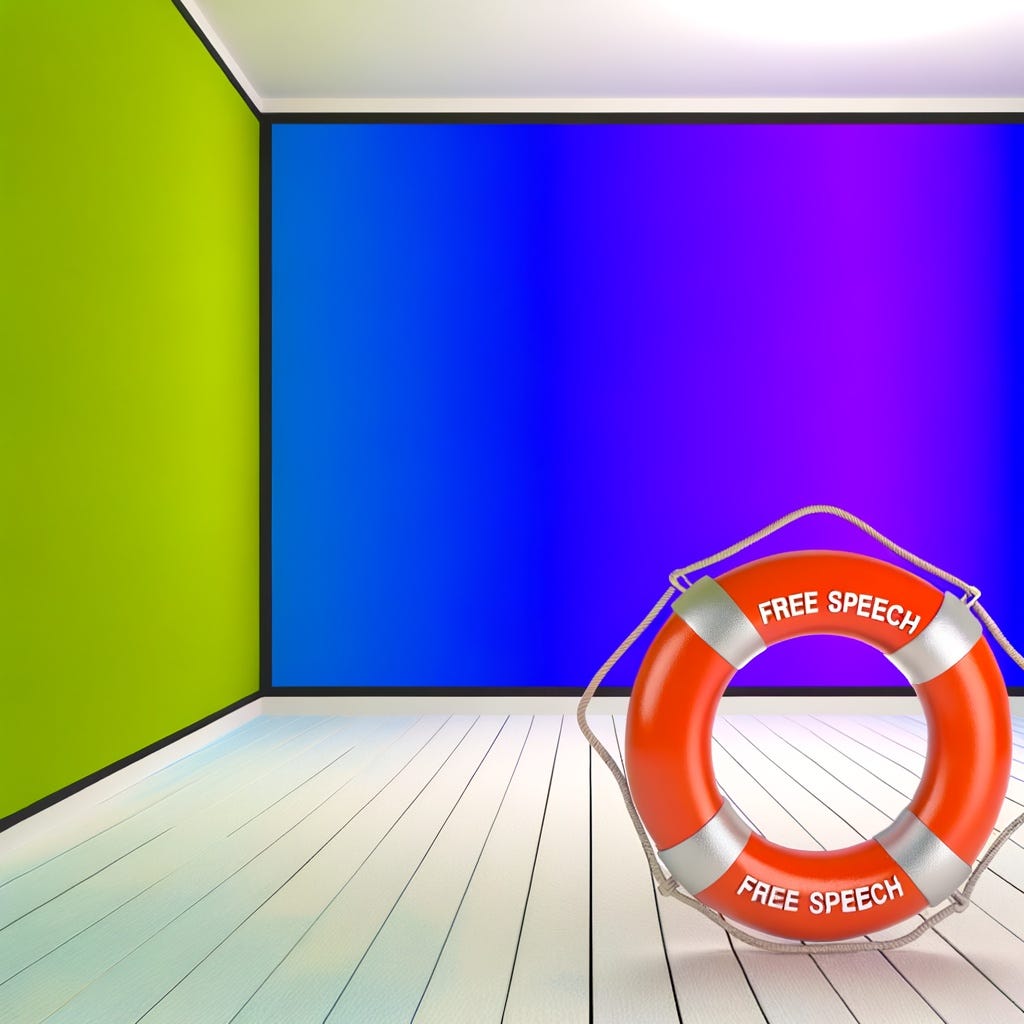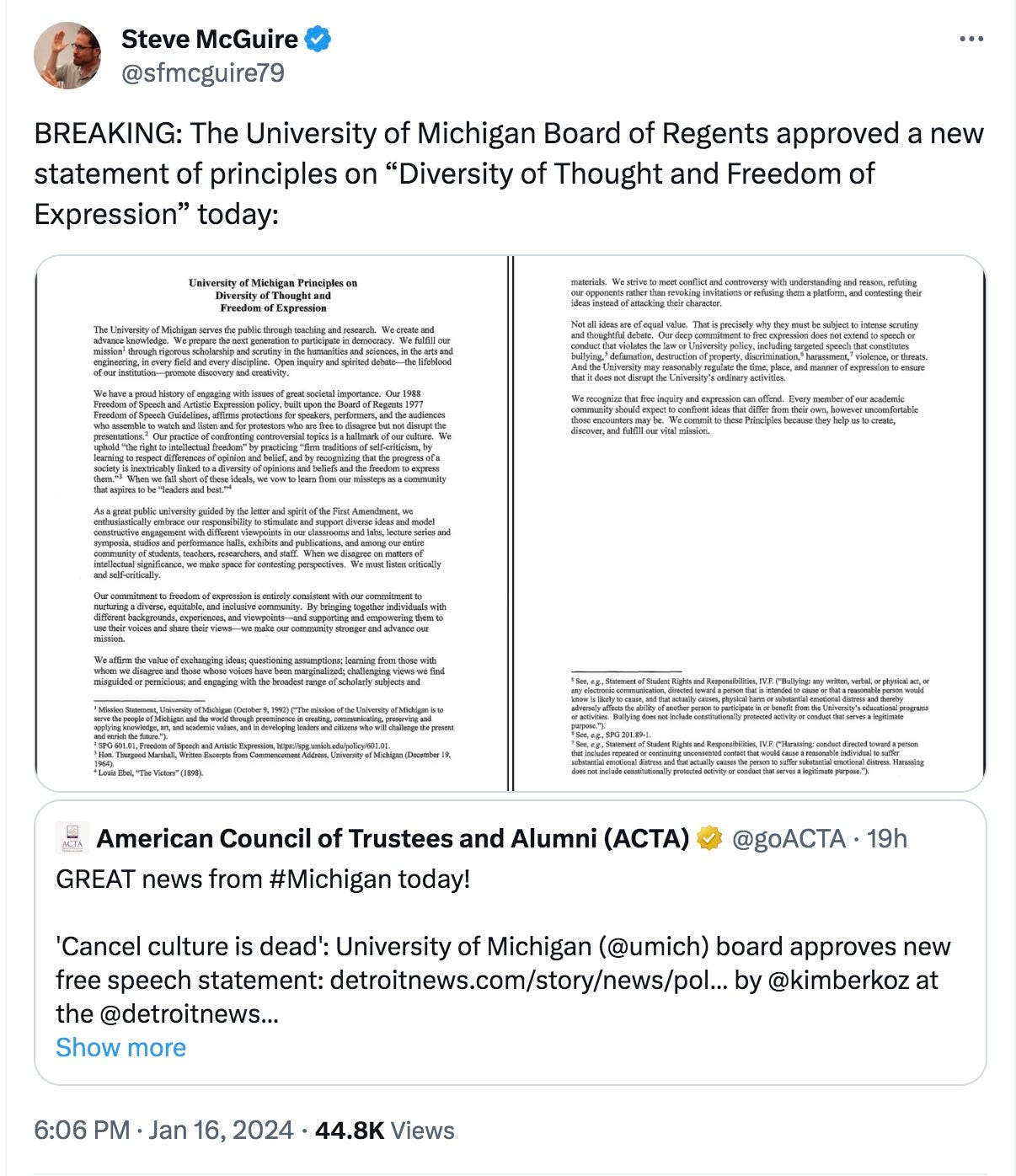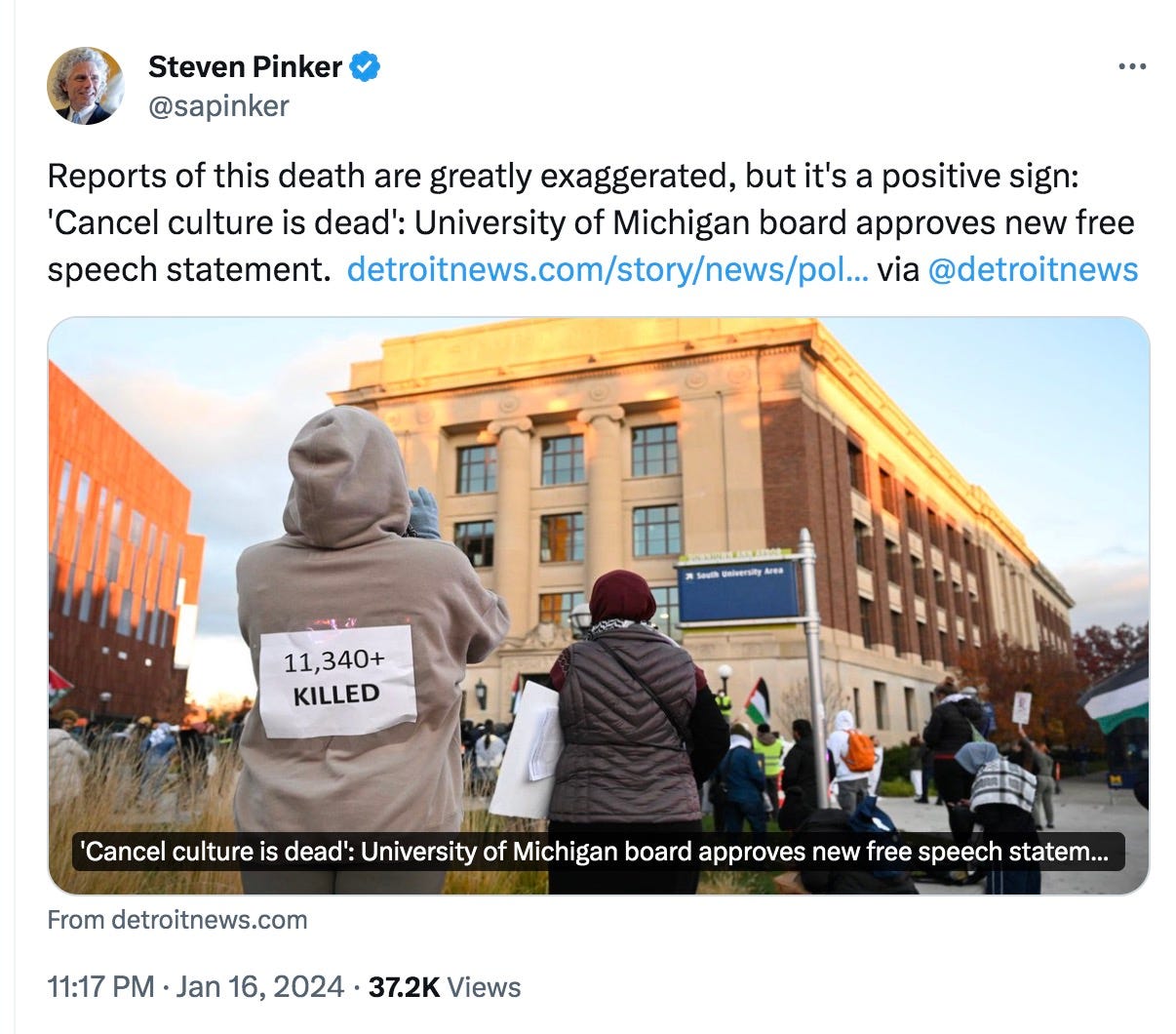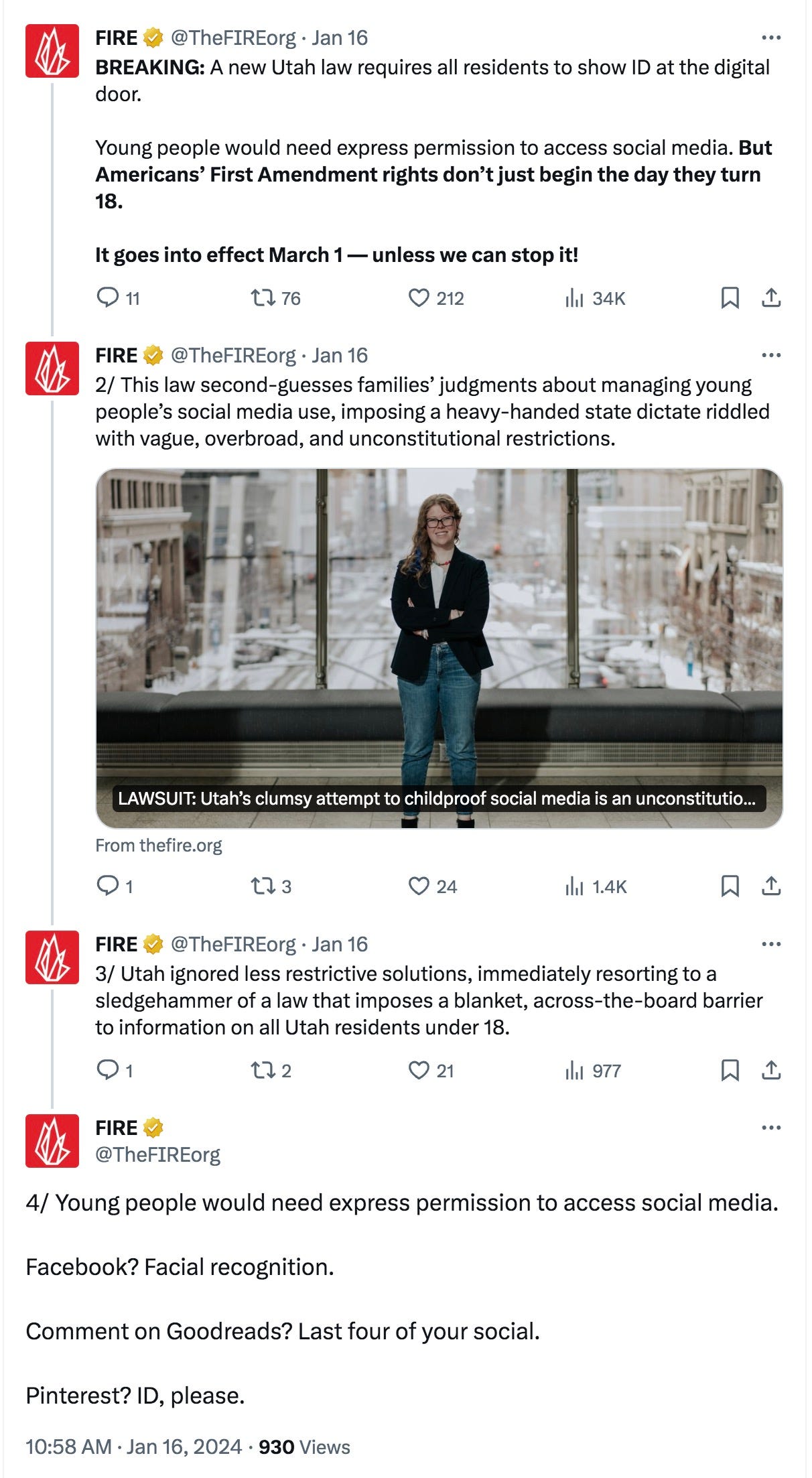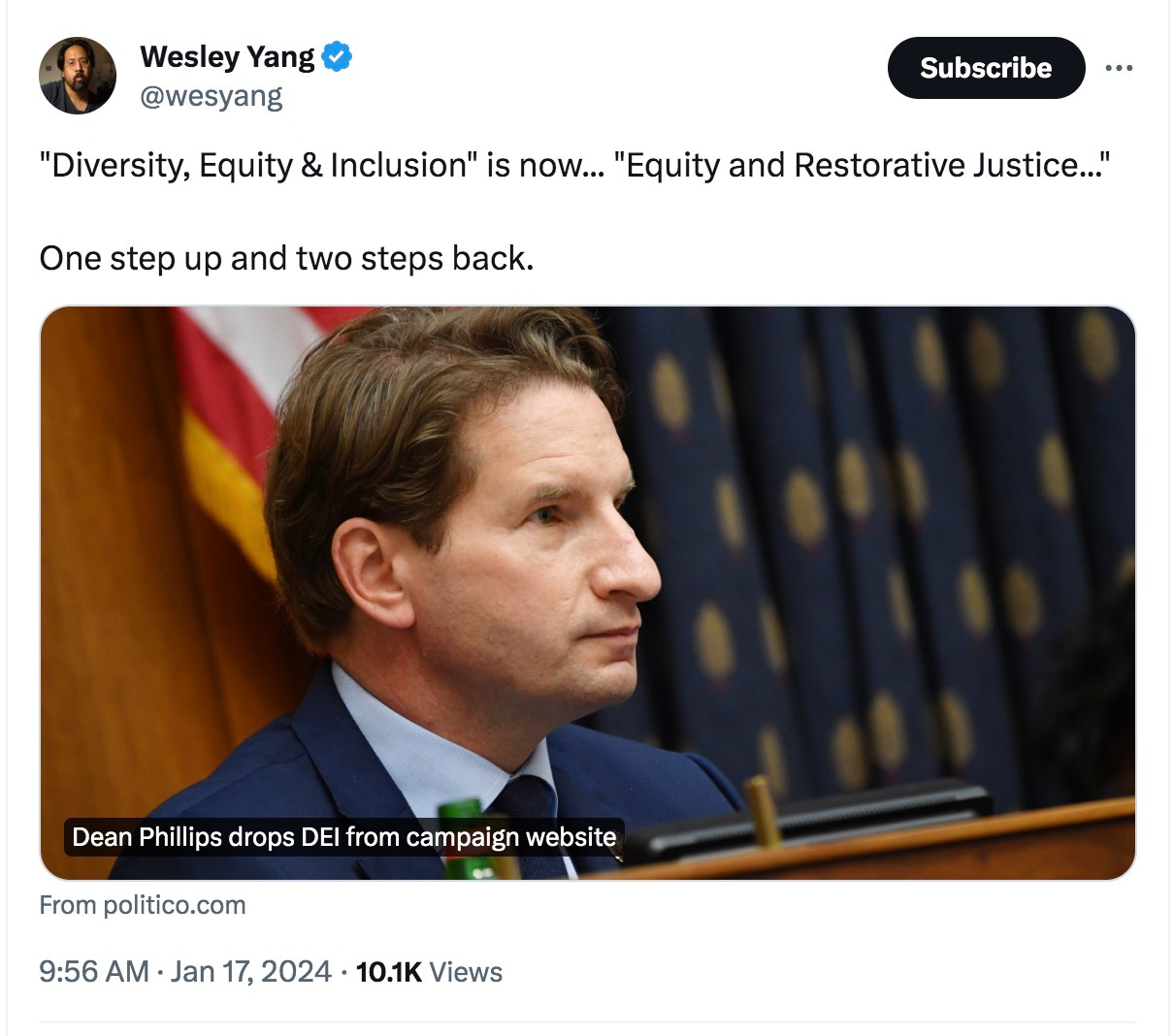E-Pluribus | January 17, 2024
Free speech isn't free; just how bad is plagiarism anyway? And free speech goes to war.
A round-up of the latest and best musings on the rise of illiberalism in the public discourse:
Wenyuan Wu: Saving Free Speech
Given that colleges and universities are usually the gatekeepers of our future leaders, the direction of free speech in higher education is highly important. Wenyuan Wu at Minding the Campus writes that while recent events may help turn the tide, free speech is by no means home free.
A recent Foundation for Individual Rights and Expressions (FIRE) survey of 2,007 U.S. undergraduates found strong evidence of a hostile environment towards free speech on college campuses. About one in ten students reported being disciplined or threatened with discipline by college administrators. When considering the total undergraduate population in the U.S. in fall 2023, over 1.6 million students may have been penalized or faced threats of discipline for sharing their views.
[. . .]
The chilling atmosphere on free speech is indiscriminate because students of all races felt uneasy about speaking their minds freely. For instance, the FIRE survey found that 42 percent of Hispanic students, 48 percent of Black students, 63 percent of Asian students, and 51 percent of White students were somewhat worried about their reputations being damaged because someone misunderstood something they expressed. In addition, 35 percent of Hispanic students, 48 percent of Black students, and 38 percent of Asian students reported feeling uncomfortable in a class as a result of something someone expressed in reference to their race or ethnicity.
[. . .]
The absurd idea that speech is violence is endorsed by far too many, as 38 percent of all students—35 percent of Hispanic, 53 percent of black, 44 percent of Asian, and 33 percent of white, reported campus expression they have heard constitutes an act of violence.
Compared with their liberal peers, more conservative students reported being subject to discipline or threats of discipline due to their speech. Among those who identify as conservative, 12 percent of somewhat conservative students and 21 percent of far-right students were disciplined or threatened with discipline by their college administrators. By contrast, the FIRE survey records seven percent of somewhat liberal students and nine percent of far-left students as being targeted for speech.
[. . .]
The public outcry against the moral bankruptcy among leaders of higher education in the wake of Hamas’s terrorist attack on Israel on October 7, 2023, signals the beginning of a long-overdue course correction. Several Harvard professors are calling for a return to academic freedom and free speech. A group of Massachusetts Institute of Technology (MIT) students got together and established the MIT Students for Open Inquiry, “America’s newest college organization for free speech and academic freedom.” The Alumni Free Speech Alliance, a national network of pro-free-speech alumni organizations founded in October 2021, has grown to induct members from 24 major American universities, including Harvard, Yale, Cornell, MIT, and UCLA. A 2023 survey of 802 undergraduate students by Yale’s Buckley Institute found that 78 percent of the respondents deemed the First Amendment as important and relevant.
But the battle to reclaim liberty and virtue in our higher education still has a long way to go.
Read it all.
Kathleen Stock: Plagiarism is not a sin
The title of this UnHerd essay might suggest Kathleen Stock is downplaying the seriousness of plagiarism, but it’s more a matter of viewing it in the proper context. Rather than focus on what the individual cases might say about the character of the offender, Stock says protecting the value of intellectual property and educating the upcoming generation about the sanctity of original ideas should be the larger goal.
At the beginning of the month, Harvard President Claudine Gay resigned following weeks of plagiarism allegations.
[. . .]
One immediate thing revealed by the row is the extent to which some on both Left and Right only care about academic principles when it suits them. The plagiarism accusations emerged just after Gay’s much-publicised appearance in a congressional hearing on antisemitism on campus in the wake of October 7, sitting alongside the presidents of MIT and the University of Pennsylvania. In a viral excerpt from the hearing, Gay and her fellow Presidents stated that “calling for the genocide of the Jews” would have to “cross into conduct” before becoming technically illicit according to their respective university policies. Many onlookers were scandalised by what looked like obvious antisemitism. Longstanding critics of DEI in universities scented blood: no doubt genuinely supportive of Israel, but also amplifying the outrage for opportunistic reasons. The Penn president was forced to resign four days later, and the combing of Gay’s back catalogue seems to have begun.
[. . .]
From the Left, meanwhile, responses to claims about plagiarism by Gay have been depressingly predictable, as attempts are made to blot out the blatant problem of a university leader, paid in six figures, committing an infraction for which students on her own campus would be sanctioned. Defensively, many have scrambled to paint a touching picture of a poor, vulnerable, black female President of Harvard unfairly set upon by racist Right-wingers. Here it seems the capacity to detect nuance, temporarily acquired with respect to pro-Palestinian speech, has vanished once again, with all outward expressions of concern about the standard of Gay’s academic writing automatically becoming something more sinister. Other commentators have claimed that the strict standards outlawing plagiarism don’t apply in the same way to academics as they do to students, or else suggested that, since other high-profile cases of plagiarism have been overlooked, this one should be too.
On the whole, then, it seems that the Right doesn’t care about academic freedom when the contested words are those of enemies; and the Left doesn’t care about academic violations when committed by their friends. But then again, it seems that some on the Right don’t care about the latter either. After a billionaire hedge fund manager called Bill Ackman was particularly scathing of Gay, a bright spark at Business Insider magazine did a search on his wife Neri Oxman’s PhD thesis and discovered apparent plagiarism there too. . .
[. . .]
. . .Despite the surrounding hyperbole, plagiarism of the kind Gay and Oxman apparently committed really isn’t that grave a moral sin, as sins go. It’s easily done and on an individual level can be detached from any deeper character flaws. The person whose phrasing is plagiarised doesn’t lose anything of value, if the imitation isn’t discovered; and if it is discovered, they gain the kudos of having written something worth imitating.
But that doesn’t mean plagiarism shouldn’t be exposed and punished severely — because it should. The infringement is intellectual not moral. The loser from even minor acts of imitation, were they permitted at scale, would be the university as a whole. If you can’t easily explain a complicated idea in your own words, the chances are you don’t fully understand it; and you certainly can’t safely be given the credit for it. Plagiarised passages offer simulacra of understanding but they are counterfeit goods. Like a luxury market, the university system cannot afford to become flooded with counterfeit goods. It would remove its main reason for existing.
Viewed like this, the punishment for plagiarism should be unfashionably medieval — aimed towards deterrent, rather than proportionality or rehabilitation. As philosopher Fabio Paglieri puts it: “The penalty must always be as harsh as possible … Sanctioning plagiarism is not about getting even on moral grounds, it’s about building a better academia to live in. Thus the punished plagiarist has to serve as a cautionary tale for anyone else who may be tempted to follow the same path.” Again, we don’t need to do a deep dive into a perpetrator’s intentions, personality trait, and background circumstances. We are not trying to work out what she or he deserves for missing out some quotation marks and a reference. We just need to put the fear of God into others, to make sure they don’t do it too.
Read the whole thing.
Alex Small: The Ugly Reality of Wartime Speech
If war is hell, as the saying goes, then speech about war and during a war isn’t going to be all roses and sunshine. At Discourse Magazine, Alex Small says the extreme nature of war and the high stakes (indeed life and death) involved mean that the bar should be extremely high for declaring anything off limits, as painful and difficult as that might be.
Late last year, University of Southern California economics professor John Strauss was barred from campus after telling pro-Palestinian demonstrators on the main quad that he hopes every member of Hamas is killed. Free speech groups have rightly rushed to his defense, and though he’s once again allowed on campus, Strauss remains under investigation, apparently for hate speech and discrimination on the basis of national origin.
As appropriate as it is to defend Strauss’ free speech rights, we should also keep in mind a sobering truth of discussing war: To side with one warring party against another is to call for deaths. Banning from campus all expressions of support for violent actors would either silence all opinionated discussion of war or else require dissembling about the nature of war. In either case, the result would be the hindering of free and open analysis of pressing matters.
[. . .]
I frankly respect Professor Strauss for having the courage to state his goals plainly rather than hiding behind euphemisms. The task of scholars and teachers is to see and discuss the world with clarity, and Professor Strauss rose to that task with an honest version of what most people usually say indirectly about war and foreign policy. If his acceptance of deaths or choice of sides is unacceptable in one’s value calculus, then his stance should be debated as a matter of ethics and international politics, i.e., treated as fit for campus discussion.
Indeed, such blunt speech would be a much-needed expansion of discussions about war. Candid descriptions of military action mostly come from two groups that overlap but are hardly synonymous: anti-war activists and combat veterans. Everyone else generally refrains from candidly admitting that the cost of war is a butcher’s bill. Explicit truth is as much a casualty in conversations about war as it is in the conduct of war.
Of course, some might accept the reality of war as Strauss does, but nonetheless oppose his call for the death of Hamas fighters, likely because they oppose Israeli policies. Opposition to Israeli policy is a stance that people have every right to vigorously advocate. However, unless Strauss crosses a line that makes the educational work of the university infeasible, by creating a genuinely threatening atmosphere inhospitable to participation by reasonable adults, he should still enjoy the right to offer arguments in favor of Israel and in opposition to Hamas.
The truth-seeking and educational work of a university requires that the institution remain neutral regarding conflicts remote from campus, so that multiple perspectives can be openly examined on campus. Surely, the most important lesson proffered by scholars of human affairs is that everything is complicated. Experts can offer reasoned, evidence-driven arguments for multiple sides of any domestic or foreign policy issue, and universities should be open to examination of varied opinions in both teaching and research.
Even in conflicts with clear-cut moral stakes (e.g., World War II), there were hard questions that could, did and still do divide reasonable people—the morality of atomic weapons, for one, or the proper posture toward a reprehensible ally like Stalin. There may be times when an institutional stance is needed, but it should be bland (“we hope for a swift resolution with as little loss of life as possible”) and allow room for debate.
[. . .]
There is nothing pleasant about the subject of war. There are ample reasons for people to avoid the topic. However, as long as grim matters of war and peace and global affairs are deemed fit for campus discussion, unpleasant sentiments must be fair game for public airing, in keeping with viewpoint-neutral rules aimed at fostering civil examination of ideas. Professor Strauss said explicitly what others say implicitly in every word, sign or sticker in support of a side in war: that he hopes that combatants for his preferred side kill combatants for the opposing side. If such speech offends one’s moral sensibilities, well, better to advocate for peace and cooperation rather than stifle discussion.
Read it all here.
Around Twitter (X)
OK, maybe cancel culture is not dead, but a positive move nonetheless from the University of Michigan. Steve McGuire and Steven Pinker comment.
Parents have legitimate concerns about their children’s access to social media. But the Foundation for Individual Rights and Expression argues that Utah is doing more to interfere with parents’ rights than actually helping them with a new law. (Click for the whole thread.)
And finally, a heads up from Wesley Yang. DEI is out… ERJ is in! (At least where Dean Phillips is concerned.)




